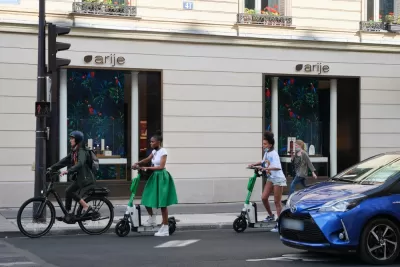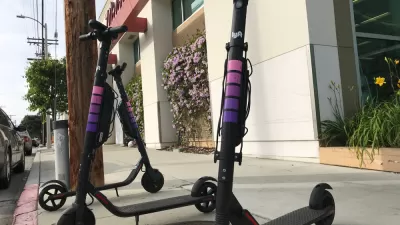Cities should expect to see increases in automobile trips, and resulting consequences, if they ban or limit the use of electric scooters or other micromobility devices, according to new research.

According to research published via open access by the journal Nature Energy, banning the use of micromobility devices (i.e., electric scooters) at night leads to a large increase in automobile trips.
The research generated reports findings of a natural experiment in Atlanta, where the city set geofences on rented scooters to disable their operation at night—“guaranteeing near perfect compliance.”
“Evidence from a natural experiment in [Atlanta] shows increases in travel time of 9–11% for daily commuting and 37% for large events,” according to the study's authors.
As noted in the study's literature review, prior research into micromobility has revealed little about the effects of the mode's adoption on automobile traffic. Findings have focused instead on loss of public transit trips as a result of shared micromobility. Notably, scooters have the opposite effect on mode share when compared to ride-hailing companies, which displace riders from public transit and active modes like biking and walking.
FULL STORY: Impacts of micromobility on car displacement with evidence from a natural experiment and geofencing policy

Planetizen Federal Action Tracker
A weekly monitor of how Trump’s orders and actions are impacting planners and planning in America.

Chicago’s Ghost Rails
Just beneath the surface of the modern city lie the remnants of its expansive early 20th-century streetcar system.

San Antonio and Austin are Fusing Into one Massive Megaregion
The region spanning the two central Texas cities is growing fast, posing challenges for local infrastructure and water supplies.

Since Zion's Shuttles Went Electric “The Smog is Gone”
Visitors to Zion National Park can enjoy the canyon via the nation’s first fully electric park shuttle system.

Trump Distributing DOT Safety Funds at 1/10 Rate of Biden
Funds for Safe Streets and other transportation safety and equity programs are being held up by administrative reviews and conflicts with the Trump administration’s priorities.

German Cities Subsidize Taxis for Women Amid Wave of Violence
Free or low-cost taxi rides can help women navigate cities more safely, but critics say the programs don't address the root causes of violence against women.
Urban Design for Planners 1: Software Tools
This six-course series explores essential urban design concepts using open source software and equips planners with the tools they need to participate fully in the urban design process.
Planning for Universal Design
Learn the tools for implementing Universal Design in planning regulations.
planning NEXT
Appalachian Highlands Housing Partners
Mpact (founded as Rail~Volution)
City of Camden Redevelopment Agency
City of Astoria
City of Portland
City of Laramie





























